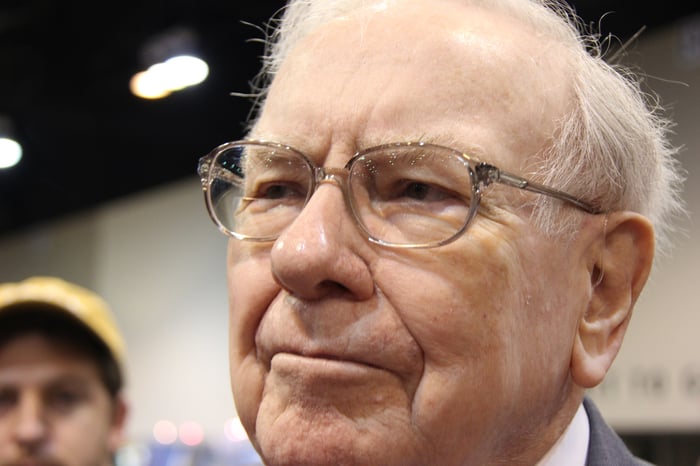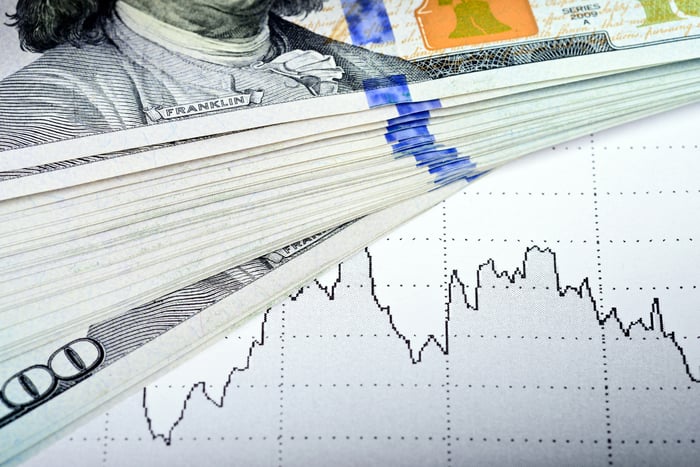Berkshire Hathaway (BRK.A 0.99%) (BRK.B 0.91%) CEO Warren Buffett is arguably one of the greatest investors of all time. He turned a nest egg of around $10,000 in the mid-1950s into a net worth of more than $108 billion, as of Feb. 14, 2023. Keep in mind that this doesn't account for the $48 billion (and counting) the Oracle of Omaha has donated to various charities over the past 17 years.
More importantly, Buffett is taking his shareholders along for the ride. Since taking the reins as CEO in 1965, he's delivered an aggregate return of 3,818,025% for the company's Class A (BRK.A) shareholders (also as of Feb. 14, 2023). He's absolutely run circles around the broad-based S&P 500 (^GSPC 0.87%) for decades.

Berkshire Hathaway CEO Warren Buffett. Image source: The Motley Fool.
Given the Oracle of Omaha's prowess for investing success, there are few announcements more anticipated than Berkshire Hathaway's 13F filings with the Securities and Exchange Commission (SEC). A 13F is a required filing by money managers and ultrawealthy individuals with at least $100 million in assets under management. With Buffett and his investing lieutenants -- Todd Combs and Ted Weschler -- overseeing a $342 billion portfolio, it most definitely needs to file a 13F with the SEC no later than 45 calendar days following the end of each quarter.
What 13Fs do is allow investors to look under the hood and follow what stocks Warren Buffett and his team bought, sold, and held in the most recent quarter. It's a way for everyday investors and professionals alike to see what the brightest minds on Wall Street have been up to, as well as decipher what stocks and trends are piquing their interest.
On Valentine's Day, Berkshire Hathaway filed its much-anticipated 13F with the SEC for the fourth quarter. Unfortunately, it contained a subtle but terrifying signal for investors.
Warren Buffett's subtle warning to investors speaks volumes
Generally speaking, Warren Buffett is an optimist. During previous Berkshire Hathaway investor events, and in Buffett's annual letter to shareholders, he's stated one way or another to "never bet against America."
In other words, the Oracle of Omaha and his team are well aware that stock market corrections, crashes, and bear markets are par for the course when investing, just as recessions are bound to occur at some point in the economic cycle. However, Buffett recognizes that the U.S. and global economy tend to grow over time and has positioned Berkshire Hathaway's investment portfolio to take advantage of this expansion.
But Berkshire Hathaway's 13F for the fourth quarter tells a different story. Buffett and his investing lieutenants added to just three existing holdings -- Apple, Paramount Global, and Louisiana-Pacific.
Meanwhile, Buffett and his team reduced their stakes in eight holdings. This included selling 71.1 million shares of U.S. Bancorp, nearly 51.8 million shares of Taiwan Semiconductor Manufacturing Company, and around 37.1 million shares of Bank of New York Mellon. Additional pare-downs occurred with Activision Blizzard, Chevron, McKesson, Kroger, and Ally Financial.
Although we won't get a precise read until Berkshire Hathaway reports its fourth-quarter operating results later this month, the rough math, using the Dec. 31, 2022, closing price on all of the above companies, shows that Warren Buffett was a big-time seller of stocks during the fourth quarter. Whereas an estimated $158.2 million in stock was purchased, a whopping $8.97 billion was sold.

Image source: Getty Images.
Warning signs are building on Wall Street
Although Buffett has been steadfast in his long-term view that stocks can be a wealth-creation machine, his actions suggest that trouble may be brewing on Wall Street.
Perhaps the telltale concern is that the stock market isn't all that cheap, despite the fact that the Dow Jones Industrial Average, S&P 500, and Nasdaq Composite all entered bear markets last year and remain well below their respective all-time highs.
For example, no bear market or steep double-digit percentage correction in the benchmark S&P 500 has found its bottom over the past 24 years with a forward price-to-earnings (P/E) ratio higher than 14. Except for the financial crisis and the 2011 correction, a forward P/E of 13 to 14 has marked the bottom for equities a number of times since the beginning of 1999.
In 2022, the S&P 500's forward P/E never fell below (roughly) 15.5, and it currently sits at 18.3. That's toward the high end of the range over the past 24 years.
S&P 500 Shiller CAPE Ratio data by YCharts.
The S&P 500 Shiller price-to-earnings ratio (also known as the cyclically adjusted price-to-earnings ratio, or CAPE ratio) also confirms that stocks are anything but "cheap." The Shiller P/E ratio is based on average inflation-adjusted earnings from the previous decade. On Feb. 14, the Shiller P/E stood at 30.04. Comparatively, the average S&P 500 Shiller P/E ratio dating back to 1870 is just 17 on the nose.
Further, previous bear markets and corrections over the past quarter of a century have found their bottom at a Shiller P/E of approximately 22. We're nowhere that level.
In addition to these two valuation metrics suggesting stocks are still pricey, three widely followed recession-probability indicators are screaming that a U.S. recession can be all but penciled in sometime in the not-too-distant future. Though the stock market has a tendency to find its bottom before the end of a recession, it's been a very long time since the major stock indexes bottomed out before a recession was even declared.
Again, I want to emphasize that Warren Buffett is a big believer in the stock market as a long-term mechanism for creating wealth. There's a reason he's advocated for investors to buy index funds and hang on to them for a long time. S&P 500 tracking indexes are surefire moneymakers when held for at least 20 years.
However, Buffett's actions during the fourth quarter speak loud and clear: Stock valuations simply aren't that attractive, with red flags mounting on Wall Street.






